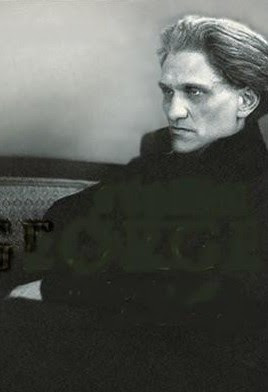Pagans in Schwabing
I am presently working as a fellow at the Lichtenberg Kolleg in Göttingen, Germany. I arrived here on April 1 and will move back to Amsterdam on July 1, so my stay is nearing its end. It has been an interesting experience to be living in a quiet German university town, and being part of a small community of scholars from all over the world who are working in many different academic disciplines and are all in the same situation away from home. Most of my afternoons and evenings I've spent reading (mostly in Göttingen's best Konditorei, because of the pleasant atmosphere without background music: ideal reading conditions for me).
This autumn I have to give a conference lecture on the "pagan" and mythical dimensions of the German poet Stefan George, and therefore part of my reading has been connected with him. George is an unusual topic for me, but he has interested me ever since my days as a conservatory student, when I got to know him through the many songs that were composed to his poetry by Arnold Schönberg and Anton Webern. Last year I read the large English biography of George by Robert L. Norton, and last week I finished its more recent German counterpart: Thomas Karlauf's Stefan George: Die Entdeckung des Charisma. An ideal biography: very well documented, equally well written, and very convincing in its interpretation of this weirdest of all poets. I am now following it up with a book about how the devoted members of George's famous "circle" handled his legacy after his death in 1933: Ulrich Rauff, Kreis ohne Meister: Stefan Georges Nachleben. Excellent quality again, and yesterday I was particularly impressed by the chapter "Hildebrandt's Lied", about the self-stylization of George and his followers as a modern "Platonic Academy" (a homo-erotic hidden church of the spirit - "Secret Germany" - consisting of handsome young men who looked up to The Master as the one to whom they owed their "spiritual regeneration"). And finally some light reading as well, still connected to the same topic: Gunna Wendt's biography Franziska zu Reventlow: Die anmutige Rebellin. As a biography it's only so-so, but it gives an interesting sidelight on the famous bohemian milieu in Schwabing, Munich, in the years before and after 1900, circling around Stefan George and his Kreis, the notorious "Kosmiker" around Ludwig Klages and Alfred Schuler, and (last but not least) the indomitable spirit of Franziska zu Reventlow herself, the "pagan madonna" of Schwabing: a novelist, painter and satiricist, free spirit, pioneer of polyamorous love, model of female self-determination, and quite simply an adorable person. Quite a positive counterpart to George, whose only concept of "friendship" was one in which the other subjugated himself completely to his will (his pupils required the Master's permission to get married! And if they were too close to him, he was sure to say "no"). A more egotistic and narcissistic personality is hard to imagine, but admittedly he was a highly gifted poet as well, next to many other things, such as the direct model for Max Weber's concept of "charisma". How George managed to cast his spell so successfully and dominate everyone around him remains something of a mystery to the present day.



Thanks for this information on the Munich pagans. Klages' influential work 'Of Cosmogonic Eros' was just published in English for the first time with Professor Bishop. https://theionpublishing.com/shop/of-cosmogonic-eros/
ReplyDelete